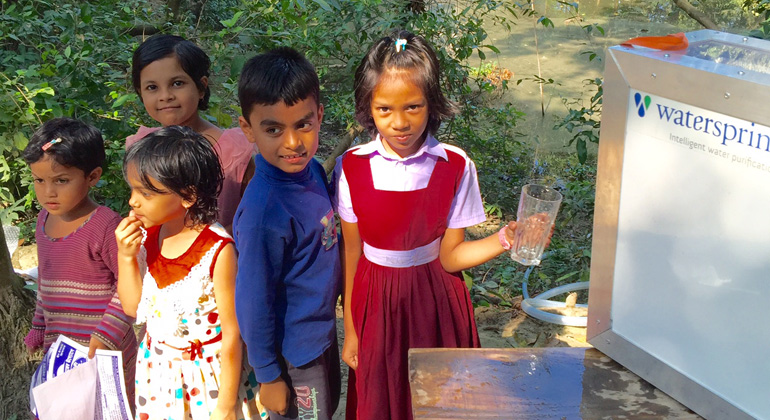Bangladesh: Access to Clean Water and Job Creation for Disadvantaged Youth through solar power
Watersprint, the Sweden-based environmental technology company, has joined the Business Call to Action (BCtA) with a commitment to provide 50,000 people in Bangladesh with access to safe and clean drinking water by 2020.
To support this effort, the company will provide training and employment to 500 disadvantaged Bangladeshi youth.
While lack of access to clean, safe drinking water is a global problem, Bangladesh is particularly hard hit. According to the World Health Organization, high levels of arsenic in the country’s groundwater – principally due to the arsenic-rich rocks through which the water is filtered – have affected nearly 35 million people in Bangladesh and contribute to 1 out of 5 deaths – the largest mass poisoning in history. Treating the country’s groundwater would require a massive investment in infrastructure.
At the same time, surface water sources such lakes, rivers and ponds are rife with bacteria and viruses, contributing to illness and deaths. Diarrheal disease is Bangladesh’s biggest killer, contributing to 62 out of every 1,000 deaths in children under five each year. Tackling surface impurities, however, does not require the same level of infrastructure investment.
Watersprint’s unique UV-LED technology is able to remove bacteria and viruses from water with very low energy consumption: the unit can run on just 12 volts from a solar panel or battery. This technology was already on the market in Sweden for use in showers for water disinfection and legionella, when it caught the attention of Nobel Laureate Muhammad Yunus. At his urging, the company developed the Watersprint product to clean bacteria and viruses from surface water, and is working with the Yunus Center in Bangladesh to train and employ young people as distributors. Ten of Watersprint’s portable Micro Production Centers (MPCs) were installed in and around Dhaka in 2015.
“With this new technology, we will take another important step towards sustainable access to safe drinking water in developing countries”, said Anders Ruland, Watersprint’s Chief Executive Officer. “For the first time, a water solution can be set up and operated without a great deal of complexity or high cost. Empowering youth through income-earning opportunities is a key component of our inclusive business model and we are pleased to be acknowledged by BCtA for our work.”
Watersprint believes its inclusive business model, which combines access to affordable, safe drinking water with training for youth as distributors, is highly scalable. The company plans to expand the same inclusive business model to three additional countries by 2030.
“Watersprint’s inclusive business model is an excellent example of the private sector’s unique ability address a market need – in this case safe, affordable water – while meeting long-term development needs such as youth employment and environmental sustainability,” said Sahba Sobhani, BCtA’s Acting Project Manager. “We are pleased to welcome Watersprint as a BCTA member and look forward to the company’s continued growth.”







